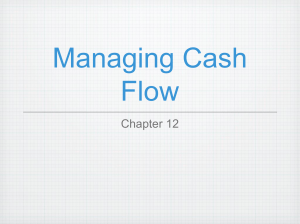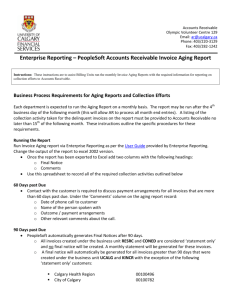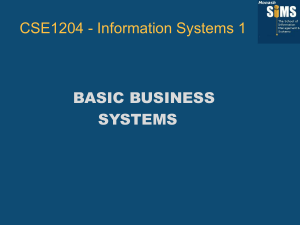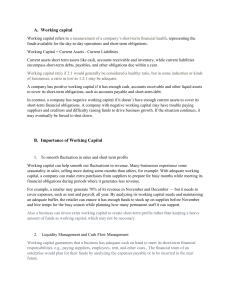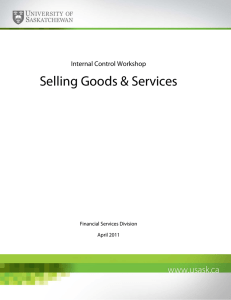Managing Cash Flow - Seattle Central College
advertisement
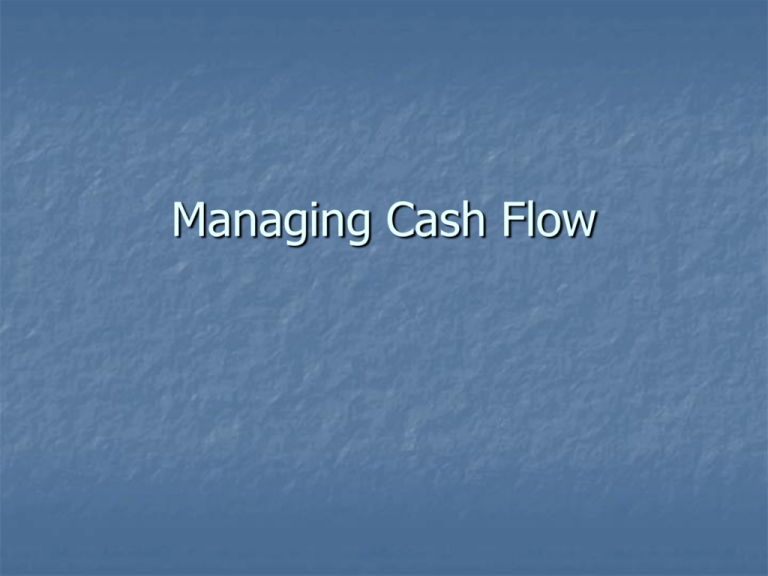
Managing Cash Flow Cash Management The process of forecasting, collecting, disbursing, investing, and planning for the cash a company needs to operate smoothly Cash Flow Cycle Order goods Receive goods Pay invoice Sell goods Deliver goods Send invoice Customer pays Total 14 25 178 3 9 50 240 days Cash Flow CASH SALES CASH ACCOUNTS RECEIVABLE ACCOUNTS PAYABLE PRODUCTION/CASH PURCHASES INVENTORY Cash Budget A cash map showing the amount and the timing of cash receipts and cash disbursements on a daily, weekly, or monthly basis Cash Budget Step 1 Determining an Adequate Minimum Cash Balance Step 2 Forecasting Sales (pessimistic, most likely, optimistic) Step 3 Forecasting Cash Receipts Step 4 Forecasting Cash Disbursements Step 5 Estimating the End-of-month Cash Balance Forecasting Sales for a Business Start-up Example No. of cars in trading zone 84,000 % imported 24% No. of imported cars in trading zone 20,160 Average expenditure in repairs $485 Total repair sales potential $9,777,600 Estimated share of market 9.9% Sales estimate $967,982 Causes of Cash Flow Problems in Small Business Difficulty collecting A/R Seasonal sales patterns Unexpected variations in sales Weak sales 29.7% 22.8% 15.4% 13.1% Collecting Delinquent Accounts No. of Months Delinquent 1 2 3 6 9 12 24 % Probability of Collection 93.8% 85.2% 73.6% 57.8% 42.8% 23.6% 13.6% Big 3 of Cash Management Accounts Receivable collect early Accounts Payable stretch payments Inventory don’t tie up cash in wrong inventory Cash Flow Concerns Collecting A/R Paying bills on time Having enough cash to attract new clients Tracking cash flow Meeting payroll 35% 26% 22% 11% 6% Accounts Receivable Credit and collection policy Screen customers before extending credit Write a firm credit policy/let customers know Send invoices promptly, clearly and accurately Encourage prompt payment Take immediate action when an account falls overdue Accounts Receivable Encouraging prompt payment Clear, accurate, timely invoices Clear description and account number Prices and language that agree with the price quotation on orders and contracts Highlighted balance due and terms Contact info Accounts Receivable Collection Blunders Delaying collection calls Failing to clearly ask for payment Sounding desperate Talking tough Trying to find out the customer’s problem Asking customers how much they can pay Continuing to talk after getting a promise to pay Calling not prepared Trusting your memory Letting the computer control collection efforts Accounts Receivable Other Techniques to Accelerating A/R Use email or fax for orders and invoices Send invoices as soon as goods are shipped Highlight invoice due date and late payment penalties Restrict credit until all bills are paid Deposit daily Closely monitor top 20% of customers who make 80% of receivables Ask for partial payment up front Watch out for customers that are going bankrupt Consider lockbox services Track results of collection efforts Consider a security agreement Accounts Payable Verify all supplier invoices before paying them Stretch payment as far as practical Take advantage of cash discounts Get favorable credit terms Work out payment terms Use credit cards Inventory Shed slow-moving inventory Schedule delivery dates at the latest possible Get from fastest suppliers Coping with Cash Crunch Investing personal funds Postponing purchases Obtaining line of credit Using a credit card Using a short-term loan Leasing rather than purchasing 28% 18% 18% 12% 11% 4% Avoiding the Cash Crunch Barter Trim Overhead Costs Sell gift cards Switch to ZBB Look out for employee theft Keep business plan current Invest surplus cash Avoiding the Cash Ask for discounts or freebies Periodically evaluate expenses Lease, instead of buy Avoid nonessential outlays Negotiate to cash flow cycle Buy used or reconditioned equipment Outsource Control employee advances or loans Develop system for check fraud Change shipping terms
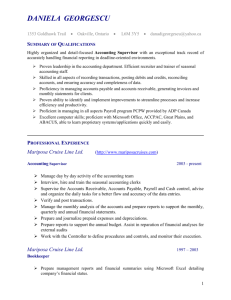
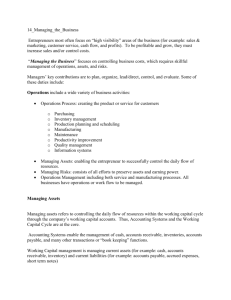
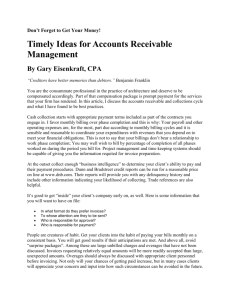
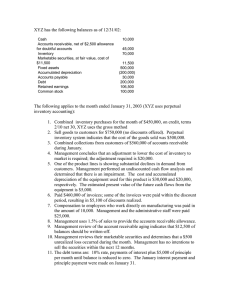

![Job Description [DOCX - 56 KB]](http://s3.studylib.net/store/data/006627716_1-621224f86779d6d38405616da837d361-300x300.png)

